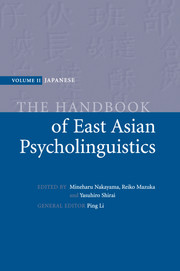Book contents
- Frontmatter
- Contents
- List of figures
- List of contributors
- In memory of Miwa Nishimura
- Preface
- Introduction
- Language acquisition
- Part II Language processing
- 26 The phonetic and phonological organization of speech in Japanese
- 27 Speech segmentation by Japanese listeners: its language-specificity and language-universality
- 28 Prosody in sentence processing
- 29 Speech errors
- 30 Effects of word properties on Japanese sentence processing
- 31 Orthographic processing
- 32 Lexical access
- 33 Incrementality in Japanese sentence processing
- 34 Processing alternative word orders in Japanese
- 35 Processing relative clauses in Japanese: coping with multiple ambiguities
- 36 Processing empty categories in Japanese
- 37 The difficulty of certain sentence constructions in comprehension
- 38 Reading and working memory
- 39 Sentence production in Japanese
- 40 The neural basis of syntactic processing in Japanese
- 41 The competition model
- 42 Connectionist models
- 43 Computational linguistics
- 44 Language and gesture as a single communicative system
- References
- Name index
- Subject index
29 - Speech errors
from Part II - Language processing
Published online by Cambridge University Press: 05 June 2012
- Frontmatter
- Contents
- List of figures
- List of contributors
- In memory of Miwa Nishimura
- Preface
- Introduction
- Language acquisition
- Part II Language processing
- 26 The phonetic and phonological organization of speech in Japanese
- 27 Speech segmentation by Japanese listeners: its language-specificity and language-universality
- 28 Prosody in sentence processing
- 29 Speech errors
- 30 Effects of word properties on Japanese sentence processing
- 31 Orthographic processing
- 32 Lexical access
- 33 Incrementality in Japanese sentence processing
- 34 Processing alternative word orders in Japanese
- 35 Processing relative clauses in Japanese: coping with multiple ambiguities
- 36 Processing empty categories in Japanese
- 37 The difficulty of certain sentence constructions in comprehension
- 38 Reading and working memory
- 39 Sentence production in Japanese
- 40 The neural basis of syntactic processing in Japanese
- 41 The competition model
- 42 Connectionist models
- 43 Computational linguistics
- 44 Language and gesture as a single communicative system
- References
- Name index
- Subject index
Summary
Overview
A speech error is defined as “an involuntary nonsystematic deviation from a speaker's usual speech arising from the malfunctioning of processing during language production; distinct from systematic ‘errors’ occurring during learning or characteristic of dialects” (Stemberger, 2003). Ever since the end of the nineteenth century, speech errors have been regarded as a “window” through which one can see how unconscious mechanisms in the mind work and how language is produced. Especially since the late 1960s, speech errors have attracted great interest in psycholinguistics. They have been used as evidence to assert or refute the reality of linguistic units and to check the validity of models of language production (Fromkin, 1973; Garrett, 1975; Stemberger, 1985; Levelt, 1989). There are, however, serious limitations in the scope of the previous work, the most notable of which is that the analyzed data have been collected exclusively from English and some related languages such as German and Dutch. Research on typologically different languages, such as Arabic, Spanish, and French, was not done until the late 1980s.
In this chapter, I will present some findings from research on speech errors in Japanese, a mora-timed, pitch accent, and agglutinative language, which is different from any of the languages mentioned above.
Approach
Typology of speech errors
Speech errors can occur at all linguistic levels, from distinctive features to discourse. They are classified into several types according to the relations between errors and intended elements, such as addition, deletion, substitution, exchange, and blend.
- Type
- Chapter
- Information
- The Handbook of East Asian Psycholinguistics , pp. 218 - 225Publisher: Cambridge University PressPrint publication year: 2006



